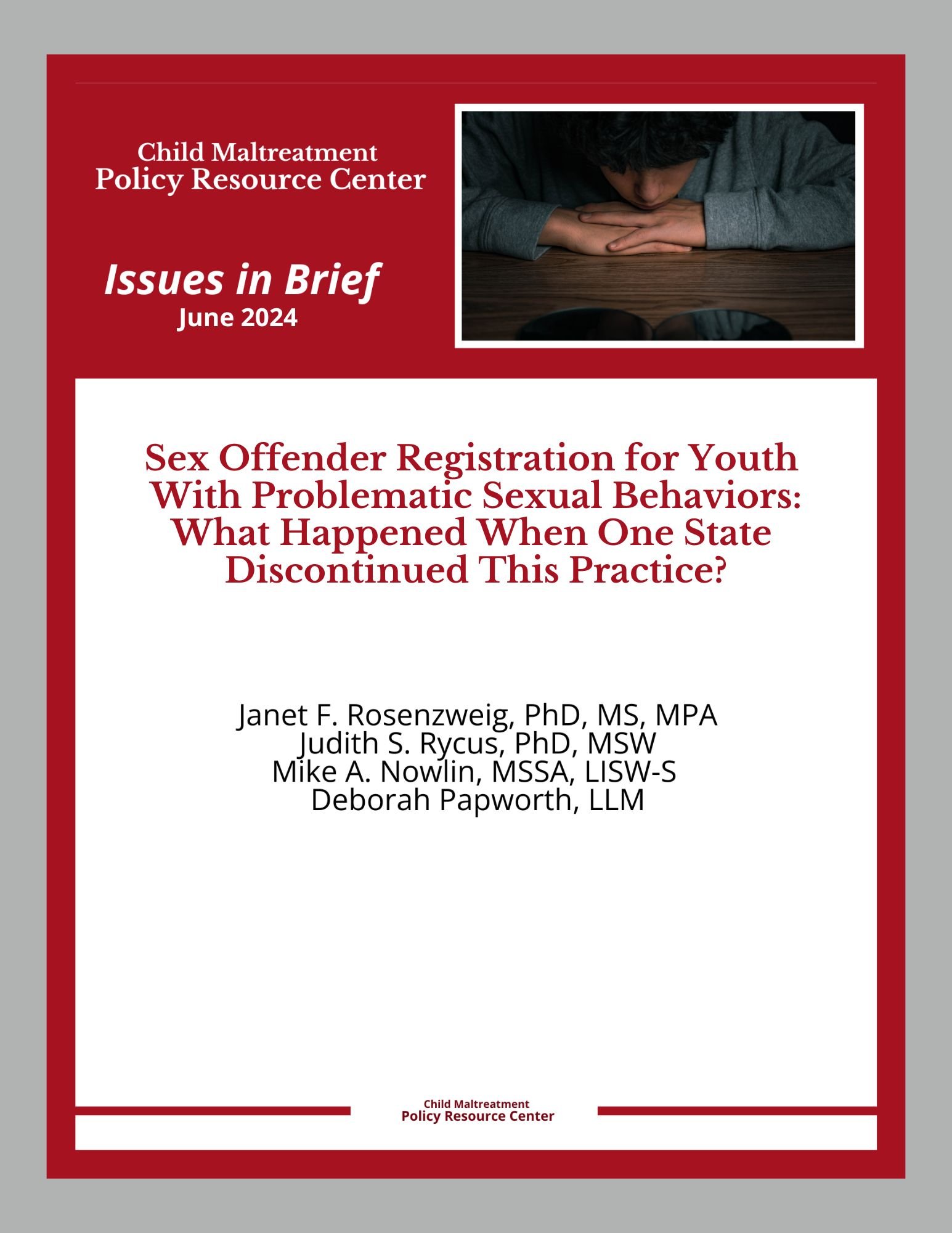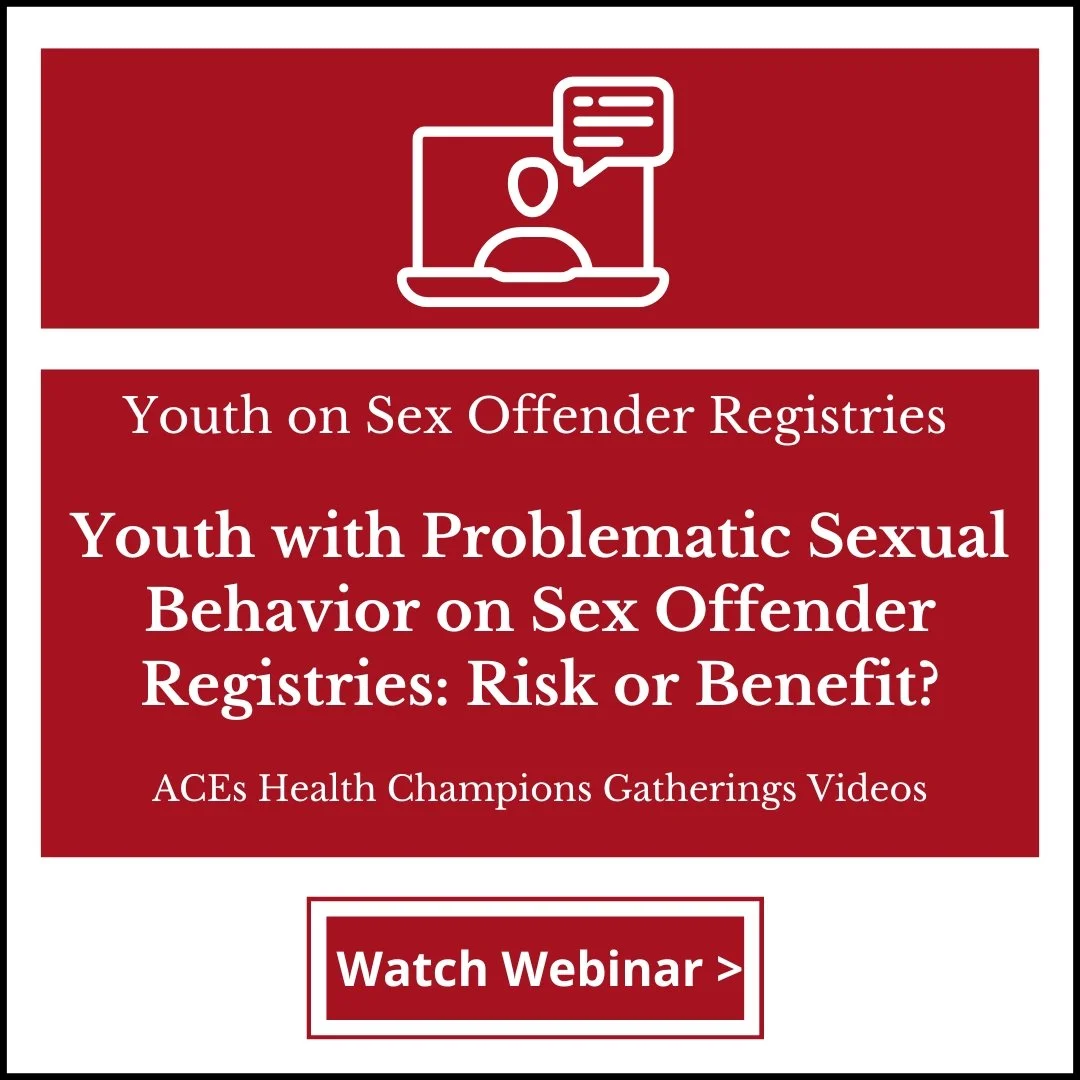
Youth on Sex Offender Registries
In 2006, the federal Sex Offenders Registration and Notification act (SORNA) required states to list youth convicted of sex-related offenses on adult sex offender registries. Registration and public notification were thought to protect the public from sexual offenders who had a high probability of reoffending, and to help law enforcement track offenders when sexual offenses occurred.
Research and clinical data have identified significant differences between youth with problematic or illegal sexual behaviors and adult sexual perpetrators. Very few youth re-offend or evolve into adult perpetrators. At the same time, youth registration has significant and often life-long detrimental consequences on youths’ development and their well-being. Some states have changed laws, policies, and procedures to reduce or eliminate this practice, including preventing anyone convicted of a sexual offense in a juvenile court from being placed on a sex offender registry.
Child Maltreatment Policy Resource Center is examining trends in youth sexual offenses in states where reforms have taken place to determine the degree to which registration serves as a deterrent or reduces recidivism. We are also exploring the practice of binding youth over to adult criminal courts for trial, thereby opening the door for registration after conviction even where reforms have been attempted. We hope to add our findings to growing clinical data that supports the work of state level advocates in eliminating or reducing the public registration of youth with problematic or illegal sexual behaviors.
Understanding the Issue
We hope that the resources on this page will raise awareness of this important topic, change behaviors and attitudes, and provide advocates with information on influencing policy outcomes.
-
Youth are placed on registries for actions committed before 18. Though meant to reduce reoffending, registries often target non-threatening behaviors, such as age-appropriate sexual exploration or consensual interactions between peers.
-
Registries cause severe harm, including stigma, lost opportunities, and mental health struggles. Families face financial strain from compliance costs and disruptions to daily life.
-
Research shows youth registries do not prevent reoffending. Youth with problematic behaviors have low recidivism rates, and evidence-based therapy is not only far more effective but also costs a fraction of what is required to manage registry compliance and enforcement.
-
After Pennsylvania ended youth registration in 2014, juvenile offenses did not increase. Youth accessed treatment and reintegrated without the stigma of being listed.
Myths and Facts
To learn more - hover over each box
Myth
Youth sex offender registration prevents future crimes.
Myth
Youth on registries are dangerous predators.
Myth
Registration only affects the youth involved.
Myth
Registration is a low-cost solution for public safety.
Myth
All states require youth to register.
Myth
Registration protects communities from harm.
Issues in Brief
Does youth sex offender registration work? Our research on Pennsylvania's decision to end this practice shows no increase in juvenile sex-related offenses, highlighting the inefficacy of registries as a deterrent. Instead, they impose lifelong consequences on youth, limiting opportunities and increasing risks.
This paper explores the benefits of evidence-based treatments over punitive measures, advocating for policies that promote rehabilitation and public safety.
Download the full report to explore the research, data, and recommendations for creating fair and effective policies for youth with problematic sexual behaviors.
Resources
Webinars
Calls To Action
Advocating for Change
-
Educate Yourself and Others: Learn about the impacts of youth sex offender registration and the benefits of evidence-based interventions.
Challenge Stigma: Use and promote non-stigmatizing terms like "youth with problematic sexual behaviors" instead of "juvenile sex offender."
Support Affected Families: Offer understanding and practical assistance to families dealing with registration requirements.
-
Raise Awareness: Host community discussions or share research-backed information about the inefficacy of youth registration and its harm.
Promote Prevention: Advocate for early intervention programs to address problematic behaviors before they escalate.
Support Local Advocacy Efforts: Join or contribute to community groups working on juvenile justice reform.
-
Use Evidence-Based Language: Shift to non-stigmatizing terminology and encourage peers to do the same.
Integrate Evidence into Practice: Incorporate community-based and family-focused treatment approaches proven to reduce recidivism.
Educate Others: Provide training for colleagues on the research, harms of registration, and effective alternatives.
-
Promote Evidence-Based Policies: Advocate for the repeal of youth registration laws and support community treatment programs.
Engage Policymakers: Share research findings with legislators and emphasize the cost-effectiveness of treatment over registration.
Collaborate with Reform Leaders: Partner with organizations, researchers, and legal experts pushing for change.
-
Promote Evidence-Based Policies: Advocate for the repeal of youth registration laws and support community treatment programs.
Engage Policymakers: Share research findings with legislators and emphasize the cost-effectiveness of treatment over registration.
Collaborate with Reform Leaders: Partner with organizations, researchers, and legal experts pushing for change.
-
Create Educational Content: Develop infographics, videos, or workshops to educate the public about the issue.
Engage the Media: Write op-eds, conduct interviews, or participate in public forums to raise awareness.
Empower Youth Voices: Share anonymized stories of affected youth to humanize the issue and build public empathy.
Contributors
Authors
Janet F. Rosenzweig, PhD, MS, MPA
Senior Policy Analyst,
Child Maltreatment Policy Resource Center
Judith S. Rycus, PhD, MSW
Program Director, Senior Policy Analyst,
Child Maltreatment Policy Resource Center
Institute for Human Services
Mike Nowlin, MSSA, LISW-S
Director of Operations,
Institute for Human Services
Child Maltreatment Policy Resource Center
Debra Papworth, LLM
Global Counsel, Consultant
Advisors
Linklaters, LLP
Legal Research Team


























